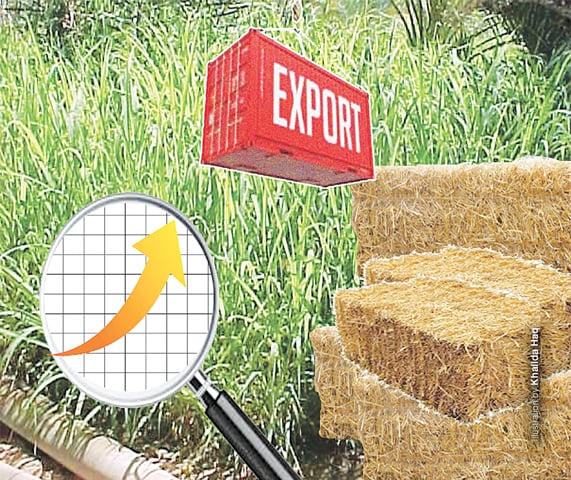
An almost 20pc rise in domestic prices of fodder following exports from Pakistan, especially of Rhodes grass and wheat-straw, to the Middle East, over the last two years has awakened all stakeholders to its serious consequences.
The process that was largely restricted to upper Sindh because the freight factor has now reached right up to central Punjab, where wheat straw has seen its prices skyrocketing to Rs400 per maund right in the middle of wheat harvesting.
The emerging issue is: Whether these increasing exports are good for farmers or if they can further hit the already under-nourished livestock?
For the last 70 years neither agriculture nor livestock departments ever took an interest in the sustainability of fodder supplies. For the first time, investment has started coming in because of export potential.
With the increase in prices of wheat-straw, farmers are taking out even the residues of wheat and selling them, leaving the soil totally dependent on chemical fertilisation. This is a dangerous process for sustainable agriculture, given the state of the country’s soil fertility position
In the last two years, two new plants have been set up near Lahore and more are on their way in the central Punjab area. The farmers are beginning to take it as a cash crop because of quick and assured returns.
Traders and middle-men are entering the market as the trade potential increases. “What is wrong with that,” asks an official of the Punjab Livestock and Diary Development Board.
The process should not cause alarm because exports are restricted to the Middle East only, especially to Saudi Arabia and the UAE. Both are small markers, with their own saturation point that may be reached quickly.
Instead of worrying, the process should be encouraged because it is good for the crop and farmers, he thinks.
This attractive picture, however, does not lessen the worries of those who think that the process would not only hit the livestock but soil as well. Given the rising local demand and wide ownership pattern of the livestock, the only persisting worry has been availability of fodder.
Around 40pc of livestock farmers are landless, who totally depend on market for feeding their animals. They are the most vulnerable lot.
“The fodder prices would also have a multiplier effect in both meat and milk sectors — taking their prices up,” fears an official of the Punjab Agriculture Department. One may not have to wait for long as the approaching Eid-ul-Azha would clarify the impact: the cost of fodder will reflect in the prices of animals being reared for the eid, he explained.
According to the farmers, an un-intended victim would be the soil. The conventional wisdom is: grain for the farmers and straw for the soil. The straw rejuvenates soil after an exhaustive crop.
With the increase in prices of wheat straw, the farmers are taking out even the residues of wheat and selling them, leaving the soil totally dependent on chemical fertilisation. This is a dangerous process for sustainable agriculture, given the state of the country’s soil fertility position.
Taking into account the arguments on both sides, Muhammad Jamshid, an exporter, thinks that the government, needs to regulate the exports. It should not ban fodder exports because of the positive impact this investment and trade is bringing to the sector.
The impetus for exports came when Saudi Arabia, given its water scarcity, banned the domestic production of fodder two years ago. On the other hand, with the import of herds from all around the world, Pakistan had also started growing and exporting Rhodes grass.
The government should carefully assess and then allow a certain quantity of fodder for export while ensuring the domestic market does not suffer. Mr Jamshed suggests a regulatory mechanism, without disturbing the trade.
Published in Dawn, The Business and Finance Weekly, May 8th, 2017
















































Dear visitor, the comments section is undergoing an overhaul and will return soon.